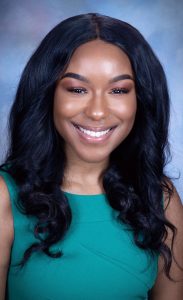OXFORD, Miss. – University of Mississippi alumna Arielle Hudson, the university’s first female African American Rhodes Scholar, plans to draw upon her experience in an inequitable primary education system as a Marshall-Motley Scholar.
The Marshall-Motley Scholars Program, named for NAACP Legal Defense Fund founder and U.S. Supreme Court Justice Thurgood Marshall and civil rights litigator Constance Baker Motley, is developing a corps of 50 civil rights attorneys over the course of five years.
Hudson is part of the second cohort and is the first UM alumnus to become a Marshall-Motley Scholar. The future litigators receive full scholarships to law school, living expense stipends, special training opportunities, summer internships and a two-year postgraduate fellowship with a civil rights organization in the South. The program was established and is administered by the Legal Defense Fund.

UM alumna Arielle Hudson is part of this year’s cohort of Marshall-Motley Scholars. The Rhodes Scholar plans to use her scholarship to attend Yale Law School and then work to make Mississippi’s educational system more equitable for all students. Submitted photo
Hudson plans to enroll at Yale Law School in August after graduating from Oxford University in July. She earned her bachelor’s degree in elementary education from UM in 2020 and is the school’s 27th Rhodes Scholar.
“The Marshall-Motley Scholars Program came out in 2021, when I was starting to think about next steps after Oxford,” Hudson said. “It’s divine intervention really, because I was supposed to be applying to law schools earlier but decided to focus on the Rhodes Scholarship process.”
The Monday following Hudson’s interview for the Rhodes Scholarship, she was scheduled to take the LSAT for law school admission. Because the scholarship process was so demanding, she was encouraged to take a break.
“The scholarship, funding and resources the Marshall-Motley program provides is tremendous,” she said. “I’m very grateful for its existence and the opportunities it creates for aspiring civil rights attorneys.”
Hudson’s aspirations were shaped by the educational inequities she and her peers experienced.
Growing up in the Tunica public schools, Hudson noticed secondhand textbooks from the private school across town. Her own school lacked technology or even basic materials.
Hudson’s mother, Tammie Turner, also a UM alumna, was able to ensure Arielle and her siblings had the necessary educational resources and support they needed because she worked in the superintendent’s office.
By middle school, Hudson knew her future would revolve around making education more equitable, especially for other Black students from the Delta.
“I saw my classmates didn’t have access to educational tools like I had, or the advantages of those that attended the private school,” she said.
“I don’t want my little sister, who is 7 years old, to deal with the inequities my friends and I dealt with in high school. And I want my 3-year-old niece to face fewer challenges than my little sister.”
Hudson’s selection to the Marshall-Motley program is no surprise to Scott Colom, district attorney for the 16th Circuit Court of Mississippi. Colom first met Hudson when she was in middle school and has been a mentor since.
“This is what Arielle has wanted to do since I met her,” Colom said. “No one I know has been as driven as Arielle to fight for civil rights.
“She has lots of characteristics that will allow her to succeed, but two stand out. She has lots of integrity – even when she disagrees, she does so respectfully. She is a lifelong learner, open to receiving new information and to developing new strategies based on that information.”
It is clear she already has learned much and will use that to guide her, he said.
“What I’ve witnessed shaped me and compelled me to seek justice on behalf of Black people” Hudson said. “My family are Black people from the South, and if we don’t commit to making change, how can we expect others to do so?
“I’m definitely the product of a village.”